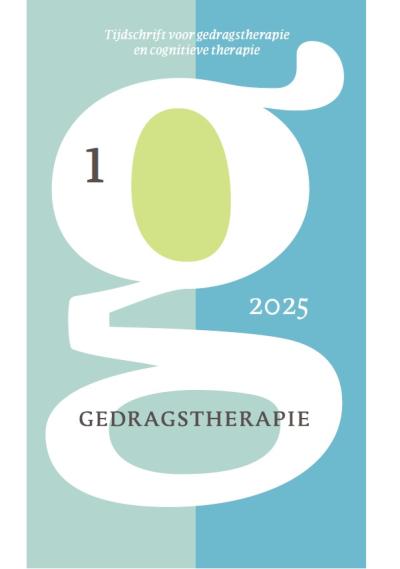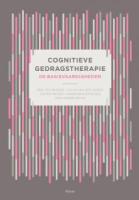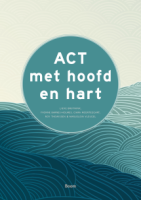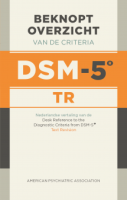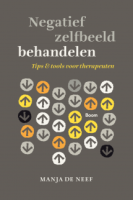Inhoud
Preventie van terugval bij recidiverende depressie met cognitieve therapie
Samenvatting
Dit artikel rapporteert de uitkomsten van een gerandomiseerd gecontroleerdestudie naar cognitieve therapie (CT) ter preventie van terugval bijeen groep dat een zeer hoog risico loopt op terugval, namelijk patiënten met recidiverende depressies. De patiënten met recidiverende depressies (N = 187), die huidig in remissie zijn na het volgen van verschillende behandelingen, werden willekeurig toegewezen aan ofwel reguliere zorg, inclusief het continueren van voorgeschreven psychofarmaca, ofwel aan reguliere zorg aangevuld met kortdurende CT. Gedurende twee jaar werd depressieve terugval (‘major depressive episode') bepaald. De aanvulling van CT aan de reguliere zorg resulteerde in een significant beschermend effect, dat effect intensifieerde naarmate er meer voorafgaande depressieve episodes waren geweest. Voor patiënten met 5 of meer eerdere episodes (41% van de steekproef), reduceerde CT de kans op terugval van 72% naar 46%. Onze bevindingen verbreden de bestaande evidentie dat cognitieve interventies tijdens remissie nuttig kunnen zijn in het voorkomen van terugval bij patiënten met recidiverende depressie.
Literatuur
- American Psychiatric Association. (1994). Diagnostic and statistical manual of mental disorders (4th ed.). Washington, DC: Author.
- Angst, J. (1997). A regular review of the long-term follow-up of depression. British Medical Journal, 315, 1143–1146.
- Beck, A.T. (1987). Cognitive models of depression. Journal of Cognitive Psychotherapy: An International Quarterly, 1, 5–37.
- Beck, A.T., Rush, A.J., Shaw, B.F., & Emery, G. (1979). Cognitive therapy of depression. New York: Guilford.
- Blackburn, I.M., Eunson, K.M., & Bishop, S. (1986). A two-year naturalistic follow-up of depressed patients treated with cognitive therapy, pharmacotherapy, and a combination of both. Journal of Affective Disorders, 10, 67–75.
- Blackburn, I.M., & Moore, R.G. (1997). Controlled acute and follow-up trial of cognitive therapy and pharmacotherapy in outpatients with recurrent depression. British Journal of Psychiatry, 171, 328–334.
- Brittlebank, A.D., Scott, J., Williams, J.M.G., & Ferrier, I.N. (1993). Autobiographical memory in depression: State or trait marker? British Journal of Psychiatry, 162, 118–121.
- Douma, M. (1991). The measurement of trait depression. Construction of Dutch Dysfunctional Attitude Scale (A version) of Arlene Weissman. Meerssen, the Netherlands: St. Lois Marie Jamin.
- Dozois, D.J.A., Covin, R., & Brinker, J.K. (2003). Normative data on cognitive measures of depression. Journal of Consulting and Clinical Psychology, 71, 71–80.
- Eaton, W.W., Anthony, J.C., Gallo, J., Cai, G., Tien, A., & Romanoski, A., et al. (1997). Natural history of Diagnostic Interview Schedule/DSM–IV major depression. The Baltimore Epidemiologic Catchment Area follow-up. Archives of General Psychiatry, 54, 993– 999.
- Evans, M.D., Hollon, S.D., DeRubeis, R.J., Piasecki, J.M., Grove, W.M., & Garvey, M.J., et al. (1992). Differential relapse following cognitive therapy and pharmacotherapy for depression. Archives of General Psychiatry, 49, 802–808.
- Fava, G.A. (1999). Subclinical symptoms in mood disorders; Pathophysiological and therapeutic implications. Psychological Medicine, 29, 47–61.
- Fava, G., Grandi, S., Zielezny, M., Rafanelli, C., & Canestrari, R. (1996). Four-year outcome for cognitive behavioral treatment of residual symptoms in major depression. American Journal of Psychiatry, 153, 945–947.
- Fava, G., Rafanelli, C., Grandi, S., Conti, S., & Belluardo, P. (1998). Prevention of recurrent depression with cognitive behavioral therapy: Preliminary findings. Archives of General Psychiatry, 55, 816–820.
- First, M.B., Gibbon, M., Spitzer, R.L., & Williams, J.B.W. (1996). User Guide for the Structured Clinical Interview for DSM–IV Axis 1 Disorders. Washington, DC: American Psychiatric Association.
- Frank, E., Kupfer, D.J., Perel, J.M., Cornes, C., Jarret, J.B., & Mallinger, A.G., et al. (1990). Three-year outcomes for maintenance therapies in recurrent depression. Archives of General Psychiatry, 47, 1093–1099.
- Garnefski, N., Kraaij, V., & Spinhoven, P. (2001). Negative life events, cognitive emotion regulation and emotional problems. Personality and Individual Differences, 30, 1311–1327.
- Geddes, J.R., Carney, S.M., Davies, C., Furukawa, T.A., Kupfer, D.J., & Frank, E., et al. (2003). Relapse prevention with antidepressant drug treatment in depressive disorders: A systematic review. The Lancet, 361, 22, 653–661.
- Goddard, L., Dritschel, B., & Burton, A. (1996). Role of autobiographical memory in social problem solving and depression. Journal of Abnormal Psychology, 105, 609–616.
- Hakkaart-van Roijen, L., Straten, A. van, Donker, M., & Tiemens, B. (2002). Manual Trimbos/IMTA questionnaire for Costs associated with Psychiatric Illness (TIC-P), Institute for Medical Technology Assessment, Erasmus University Rotterdam.
- Hamilton, M. (1960). A rating scale for depression. Journal of Neurology, Neurosurgery and Psychiatry, 23, 56–62.
- Jarrett, R.B., Basco, M.R., Risser, R.C., Ramanan, J., Marwill, M., & Kraft, D., et al. (1998). Is there a role for continuation phase cognitive therapy for depressed outpatients? Journal of Consulting and Clinical Psychology, 66, 1036–1040.
- Jarrett, R.B., Kraft, D., Doyle, J., Foster, B.M., Eaves, G.G., & Silver, P.C. (2001). Preventing recurrent depression using cognitive therapy with and without a continuation phase. Archives of General Psychiatry, 58, 381–388.
- Johnston, D. (1981). Depression: Treatment compliance in general practice. Acta Psychiatrica Scandinavica, 63 (Suppl), 447–453.
- Kessing, L.V., Hansen, M.G., Andersen, P.K., & Angst, J. (2004). The predictive effect of episodes on the risk of recurrence in depressive and bipolar disorders; a life-long perspective. Acta Psychiatrica Scandinavica, 109, 339–344.
- Klerman, G. (1990). Treatment of recurrent unipolar major depressive disorder. Archives of General Psychiatry, 47, 1158–1162.
- Kraaij, V., & Wilde, E.J. de (2001). Negative life events and depressive symptoms in the elderly: A life span perspective. Aging and Mental Health, 5, 84–91.
- Ma, S.H., & Teasdale, J.D. (2004). Mindfulness-based cognitive therapy for depression: Replication and exploration of differential relapse prevention effects. Journal of Consulting and Clinical Psychology, 72, 31–40.
- Murray, C.J.L., & Lopez, A.D. (1997). Alternative projections of mortality and disability by cause 1999–2020: Comprehensive assessment of mortality and disability from disease: Global Burden of Disease study. The Lancet, 349, 1498–1504.
- Paykel, E.S., Scott, J., Teasdale, J.D., Johnson, A.L., Garland, A., & Moore, R. et al. (1999). Prevention of relapse in residual depression by cognitive therapy: A controlled trial. Archives of General Psychiatry, 56, 829–835.
- Peeters, F., Wessel, I., Merkelbach, H., & Boon-Vermeeren, M. (2002). Autobiographical memory specificity and the course of major depressive disorder. Comprehensive Psychiatry, 43, 344–350.
- Piccinelli, M., & Wilkinson, G. (1994). Outcome of depression in psychiatric settings. British Journal of Psychiatry, 164, 297–304.
- Pollock, L.R., & Williams, J.M.G. (2001). Effective problem solving in suicide attempters depends on specific autobiographical recall. Suicide and Life Threatening Behavior, 31, 386–396.
- Post, R.M. (1992). Transduction of psychosocial stress into the neurobiology of recurrent affective disorder. American Journal of Psychiatry, 149, 999–1010.
- Rabkin, J.G., & Klein, D.F. (1987). The clinical measurement of depressive disorders. In A. Marsella, R. Hirschfeld, & M. Katz (Eds.), The measurement of depression (pp. 30–83). New York: Guilford.
- Segal, Z.V., Williams, J.M.G., & Teasdale, J.D. (2002). Mindfulnessbased cognitive therapy for depression: A new approach to preventing relapse. New York: Guilford.
- Segal, Z.V., Williams, J.M., Teasdale, J.D., & Gemar, M. (1996). A cognitive science perspective on kindling and episode sensitization in recurrent affective disorder. Psychological Medicine, 26, 371–380.
- Shea, M.T., Elkin, I., Imber, S.D., Sotsky, F.M., Watkins, J.T., & Collins, J.F., et al. (1992). Course of depressive symptoms over follow-up: Findings from the NIMH Treatment of Depression Collaborative Research Program. Archives of General Psychiatry, 49, 782–787.
- Simons, A.D., Murphy, G.E., Levine, J.L., & Wetzel, R.D. (1986). Cognitive therapy and pharmacotherapy for depression: Sustained improvement over one year. Archives of General Psychiatry, 43, 43–50.
- Teasdale, J.D., Scott, J., Moore, R.G., Hayhurst, H., Pope, M., & Paykel, E.S. (2001). How does cognitive therapy prevent relapse in residual depression? Evidence from a controlled trial. Journal of Consulting and Clinical Psychology, 69, 347–357.
- Teasdale, J.D., Segal, Z.V., & Williams, J.M.G. (1995). How does cognitive therapy prevent depressive relapse and why should attentional control (mindfulness) training help? Behaviour Research and Therapy, 33, 25–39.
- Teasdale, J.D., Segal, Z.V., Williams, J.M.G., Ridgeway, V.A., Soulsby, J.M., & Lan, M.A. (2000). Prevention of relapse/recurrence in major depression by mindfulness-based cognitive therapy. Journal of Consulting and Clinical Psychology, 68, 615–623.
- Thase, M.E., Simons, A.D., McGeary, J., Cahalane, J.F., Hughes, C., & Harden, T., et al. (1992). Relapse after cognitive behaviour therapy of depression: Potential implications for longer courses of treatment. American Journal of Psychiatry, 149, 1046–1052.
- Van Londen, T., Molenaar, R.P.G., Goekoop, J.G., Zwinderman, A.H., & Rooijmans, H.G.M. (1998). Three- to 5- year prospective follow-up of outcome in major depression. Psychological Medicine, 28, 731–735.
- Van Weel-Baumgarten, E.M., Bosch, W.J. van den, Hekster, Y.A., Hoogen, H.J. van den, & Zitman, F. G. (2000). Treatment of depression related to recurrence: 10-year follow-up in general practice. Journal of Clinical Pharmacy & Therapeutics, 25, 61–66.
- Viguera, A.C., Baldessarini, R.J., & Friedberg, J. (1998). Discontinuing antidepressant treatment in major depression. Harvard Review of Psychiatry, 5, 293–306.
- Vingerhoets, A.J., & Tilburg, M.A.L. van (1994). Everyday Problem Checklist (EPCL). Lisse: Swets & Zeitlinger.
- Weissman, A.N. (1979). The Dysfunctional Attitude Scale. Academic dissertation, University of Pennsylvania (Dissertation Abstracts International: 40, 1389B–1390B).
- Williams, J.M.G., & Scott, J. (1988). Autobiographical memory in depression. Psychological Medicine, 18, 689–695.
 © 2009-2025 Uitgeverij Boom Amsterdam
© 2009-2025 Uitgeverij Boom Amsterdam
De artikelen uit de (online)tijdschriften van Uitgeverij Boom zijn auteursrechtelijk beschermd. U kunt er natuurlijk uit citeren (voorzien van een bronvermelding) maar voor reproductie in welke vorm dan ook moet toestemming aan de uitgever worden gevraagd:
Behoudens de in of krachtens de Auteurswet van 1912 gestelde uitzonderingen mag niets uit deze uitgave worden verveelvoudigd, opgeslagen in een geautomatiseerd gegevensbestand, of openbaar gemaakt, in enige vorm of op enige wijze, hetzij elektronisch, mechanisch door fotokopieën, opnamen of enig andere manier, zonder voorafgaande schriftelijke toestemming van de uitgever.
Voor zover het maken van kopieën uit deze uitgave is toegestaan op grond van artikelen 16h t/m 16m Auteurswet 1912 jo. Besluit van 27 november 2002, Stb 575, dient men de daarvoor wettelijk verschuldigde vergoeding te voldoen aan de Stichting Reprorecht te Hoofddorp (postbus 3060, 2130 KB, www.reprorecht.nl) of contact op te nemen met de uitgever voor het treffen van een rechtstreekse regeling in de zin van art. 16l, vijfde lid, Auteurswet 1912.
Voor het overnemen van gedeelte(n) uit deze uitgave in bloemlezingen, readers en andere compilatiewerken (artikel 16, Auteurswet 1912) kan men zich wenden tot de Stichting PRO (Stichting Publicatie- en Reproductierechten, postbus 3060, 2130 KB Hoofddorp, www.cedar.nl/pro).
No part of this book may be reproduced in any way whatsoever without the written permission of the publisher.
Inloggen VGCt en VVGT
Leden van de VGCt en de VVGT loggen in via de site van hun vereniging. Als u op die site bent ingelogd als lid, vindt u daar een button naar het Tijdschrift voor Gedragstherapie.
English
Behavioral Therapy: Journal for Behavioral Therapy and Cognitive Therapy ISSN 0167-7454
Information in English can be found here.



